A FIFTH GENERATION FILMMAKER ZHANG YIMOU
A FIFTH GENERATION FILMMAKER ZHANG YIMOU

Zhang Yimou, born on November 14, 1950 in Shaanxi province of China is a Chinese film director, producer, writer and actor, and former cinematographer. He is counted amongst the Fifth Generation of Chinese filmmakers, having made his directorial debut in 1987 with Red Sorghum. He had developed a passion for visual arts as a young man, with a particular interest in films and photography, and reportedly sold his own blood to purchase his first camera. Zhang's 1982 graduating class would form the core of the Fifth Generation, a group of Chinese filmmakers who would challenge both accepted notions of storytelling and the government's control over creative endeavors through their works.
After graduation in 1982, Zhang and three of his classmates were sent to the rural Guangzi Film Studio to work as director's assistants. They formed their own collective and began creating their own features. Initially, Zhang worked as a cinematographer, bringing his unique sense of color and composition. In 1985, Zhang was sent back to Xi'an, where he served as both cinematographer and lead actor, which earned him the Best Actor Award at the Tokyo International Film Festival. Zhang finally stepped behind the camera as director for 1987's "Red Sorghum". The film's true calling card was the lead performance of 21-year-old Gong Li, with whom Zhang would have a lengthy professional and personal relationship. Gong's presence helped to make "Sorghum" an international hit, earning the Golden Bear at the 38th Berlin International Film Festival and scores of other festival awards.
"Ju Do" (1990) was a harrowing drama with Gong as a victim of arranged marriage. It received an Oscar nomination for Best Foreign Film - the first Chinese feature to ever earn such an honor. "Raise the Red Lantern" (1992) starred Gong as a concubine who discovered the abusive, patriarchal world of 1920s aristocracy. It too received a Foreign Film Oscar nomination. However, its anti-authority message resulted in the Chinese government banning it from theaters, a fate that had also befallen "Ju Do."

"The Story of Qiu Ju" (1992) marked a turning point in Zhang's career. A major hit both abroad and in mainland China, where its message was adopted as part of a large anti-corruption campaign, "Qiu Ju" won the Golden Lion at the 1992 Venice Film Festival. For a brief period, Zhang was as adored in his native country as he was around the world.
"Hero" (2002) starred some of the biggest names in Chinese film, including martial arts stars Jet Li, Donnie Yen and Tony Leung. A massive hit in China, "Hero" was the highest grossing film in Chinese movie history. Despite its nomination for Best Foreign Language Film in 2003, it took the efforts of director Quentin Tarantino and executives at Miramax's parent company, Disney, to secure an uncut, subtitled presentation.
In 2006, Zhang reunited with Gong Li for the first time in over a decade for "Curse of the Golden Flower". At the time of its release, it was the most expensive film ever made in China. In 2011, Zhang directed "The Flowers of War," a drama about an American mortician (Christian Bale). Its $94 million budget surpassed other movies as the most expensive Chinese film made to date.
Source: Internet